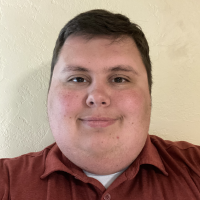Intergenerational workshops help children showcase heritage through book series Bigger Than Me: My Story, My Culture
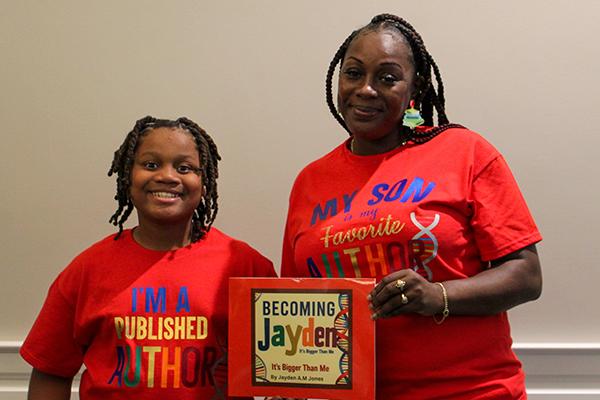
A local intergenerational workshop series is helping children in central Ohio connect with their history by writing self-published books that tell stories of their unique heritage.
The program, led by Associate Professor Michelle Wibbelsman and Ohio State colleagues in partnership with Bexley Public Library and with support from a number of Ohio State units, featured children from ages 8-12 and their families taking part in a series of after-school workshops beginning in the fall and lasting through this spring. During these sessions at Bexley Public Library, the children and their families were taught techniques like oral history, interviewing and conducting library research to learn about their heritage and write their books.
“Families invested a lot of time in following up, doing interviews and doing their own independent work,” said Wibbelsman, who teaches in the Department of Spanish and Portuguese. “This time commitment speaks really highly about the program.”
The workshops culminated in Bigger Than Me: My Story, My Culture, a collection of books created by the children that were showcased for family and friends, community members and representatives from the children’s schools and Ohio State at Bexley Public Library on March 23.
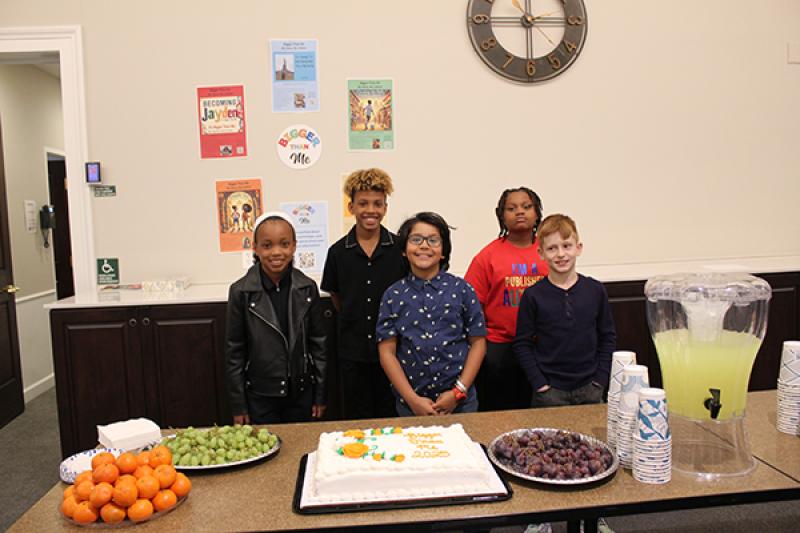
The book launch and signing included titles like:
- The Dynamic Duo and the Journey Through the Past by Helene Claire Afia Osei
- Это Family שֶׁלִי Etah Family Sheli This is My Family by Sam Gorelik
- The Hidden Time Door: Abe and the Desert of the Past الباب الخفي عبر الزمن ; آبي وصحراء الماض by Abe Alhashimi
- Chasing the Ball, Finding Ghana by Jude Osei
- Becoming Jayden: It's Bigger Than Me by Jayden A. M. Jones.
All books are now available for purchase and will soon be available in libraries.
“Anytime I saw my son during the showcase, he was beaming,” said one parent. “It was so sweet. I think it only hit him at that point, ‘Oh, wow, this is something that I did, and I did good and everyone's here to support me and congratulate me on what I did.’ "
At the showcase, the children were able to celebrate their work with family, friends, teachers and classmates and discuss their books with attendees, including Dean David Horn from the College of Arts and Sciences and other Ohio State faculty, answering questions about their heritage and their creative process.
“I think that the event validated their effort, their sustained commitment to the program,” Wibbelsman said. “It also developed another element that is part of this program, which is for the kids to step into their roles as authors and to develop an ability to do public speaking or reading. To feel comfortable doing these things is one more step beyond. We saw over the course of that afternoon exactly that, where the kids started developing a confidence in talking to people about their work.”
Connecting With Their Roots
The idea for these workshops came out of a collaboration between Wibbelsman and Bexley Public Library youth services manager Julie Perdue, and involved participation from Ohio State Ethnic Studies librarian Leticia Wiggins, Ohio State alumna Hallie Fried ‘22 and Perdue’s team of youth librarians and tech services librarians at Bexley Public Library. But much of the material was based on the experience Wibbelsman – who grew up in Ecuador – had writing On the Wings of the Condor, a children’s book she wrote for her son, Kai, about their Andean heritage.
While On the Wings of the Condor may have served as a guide, the children involved in this program took full advantage of the opportunity, each establishing their own creative narrative structure for delving into their heritage. This process truly started taking shape during a workshop in which Columbus artist Hakim Callwood did sketches of the children while discussing their background.
“A lot of kids talked about their sports or their interests, and what Hakim does is that, as he's drawing the portraits, he's including these elements of their stories as a holistic representation,” Wibbelsman said. “He generated these beautiful portraits of the kids, and his intervention was strategic in that he was the first adult-like audience - or actually any audience - that they could initially start brainstorming or telling their story to.”
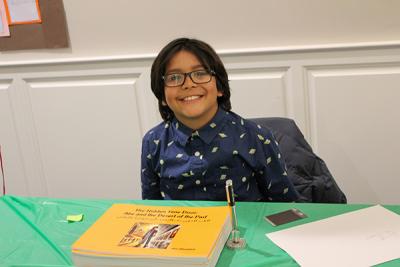
From there, ideas for the books began flowing freely. One child, taking a science fiction approach for his book, wrote a story about going back in time several generations to interview a great-great-great grandparent, while another wrote a mystery book about searching for clues based on a Ghanian artifact in her home.
Some took a more culturally immersive approach, with one child’s story revolving around playing soccer in Ghana before going home to share stories and food with his friend’s family. Another child had a unique approach in his book, writing in English, Russian and Hebrew, and one child who had less access to interviewing their family wrote from the perspective of a heritage maker for future generations.
“The kids took it in really creative directions that we had not anticipated,” Wibbelsman said. “Each one of them found their way toward really engaging their cultural heritage and getting into the research and weaving the research in very creative ways into their stories that made it really personal for the kids.”
Making An Impact
These workshops allowed families the opportunity to learn more about their heritage, but it also served as a way to bring them closer together. In addition to time spent together at the workshops, much of the work was done at home, with children using strategies learned during the workshops to further their research efforts and complete their books.
“I think that there was a real emphasis on thinking about doing research and writing as quality family time,” Wibbelsman said. “That intergenerational piece was absolutely key, where it's not kids getting dropped off at an after-school activity or parents doing it on their own, but it really is this kid-parent-grandparent type of collaboration.”
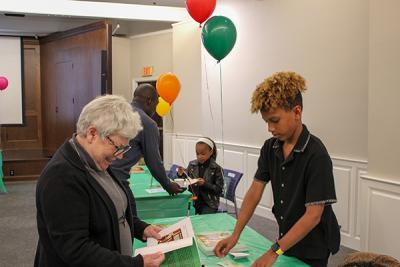
And with the program’s first run in the books, Wibbelsman and Perdue are hoping to continue fostering the collaboration between Ohio State and public libraries, potentially expanding this project to include additional libraries in Columbus as well as rural libraries in Ohio, affording kids throughout the state a chance to learn more about their heritage and gain valuable experience writing and researching.
“This was such a rewarding experience on both ends,” Wibbelsman said. “For the kids, this idea of an activity that is rewarding just for its own sake, not because there's credit, or not because it gives you a leg up for some educational advantage, it's just rewarding in and of itself because of the time that was spent together.
“Then on the team’s end, it was uplifting to do these workshops every week, looking forward to interacting with the kids and the parents who were so eager and excited and appreciative of this unique opportunity with Bexley Public Library and Ohio State.”
To learn more about Bigger Than Me: My Story, My Culture, visit bexleylibrary.org/biggerthanme.

